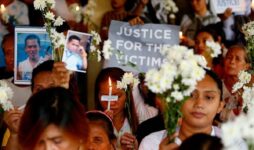
Church, rights body renew call for Duterte’s ‘drug war’ probe
THE Catholic Church and New York-based Human Rights Watch (HRW) have urged the Philippine government to push strongly for an investigation into the controversial anti-drug campaign of then-President Rodrigo Duterte, following the recent testimony of Lieutenant Colonel Jovie Espenido, the poster boy of Duterte’s “bloody” drug war from 2016 to 2022.
Carlos Conde, HRW senior researcher, said “the complicity of these people in the corruption and abuses related to the drug war has been firmly established by the testimony of Lieutenant Colonel Espenido.”
“He is, in effect, a whistleblower, an insider whose testimony carries much weight. Of course, we’ve known all along that Duterte and others were involved in all this—that’s the main reason why the drug war was so violent and unchecked,” Conde said.
“Espenido’s testimony should prompt the Philippine government to investigate and prosecute these people to the full extent of the law. The thousands of Filipinos who died in their brutal campaign deserve no less,” he added.
Various rights groups claimed that over 20,000 civilians were killed during the drug war, which also prompted The Hague-based International Criminal Court (ICC) to probe Duterte and several other personalities.
“The Church is clear on its stand. Anything that violates human rights, we don’t want it,” said Jing Rey Henderson, head of communications and partnership development of Caritas Philippines, the humanitarian arm of the Catholic Bishops’ Conference of the Philippines (CBCP).
“If there is evidence of human rights violations, the Church is always there to help the victims and demand justice. We also pray that all these inquiries in aid of legislation will bring us social justice,” Henderson told Sunstar Philippines.
Janice, a source who requested anonymity due to security reasons, also hoped that with Espenido’s testimony, “we will soon receive justice for the death of a family member due to the drug war” in the Eastern Visayas region.
Speaking before a nationally televised House panel inquiry that probed illegal drugs, extrajudicial killings, and the entry of illegal Philippine Offshore Gaming Operators (Pogos) in the country on August 28, Espenido tagged Duterte, then-Philippine National Police (PNP) chief and now Senator Ronald Dela Rosa, and Duterte’s former special assistant to the president and now Senator Christopher Lawrence Go to the drug war.
Espenido added that the “PNP is the biggest crime syndicate in the country.”
As this developed, Senators Dela Rosa and Go vehemently denied all the accusations hurled at them by Espenido.
“I would also like to remind my fellow legislators to be critical in their investigation. Part of our duty is to find out the truth and make laws that will protect the rights of every Filipino — not to slander or implicate other people’s names based on rumors alone,” Senator Go said in a public statement on August 28.
Meanwhile, former Justice Secretary and Senator Leila De Lima, a vocal critic of the drug war, hailed Espenido for bringing to light the alleged state-sponsored drug killings.
“I’m sure Police Lieutenant Colonel Espenido knows more. He must tell all. Time for redemption,” De Lima wrote on August 29.
PNP chief General Rommel Francisco Marbil also expressed “deep concern and sadness” over Espenido’s accusations against the entire police force.
“We acknowledge that a small percentage of individuals may stray from the right path, but they do not represent the majority of our dedicated and honorable police officers,” Marbil said in a statement to the media on August 29.
Espenido, 55, who is due to retire from service in October 2024, became a central figure when he was “handpicked” by the Duterte administration to lead anti-drug campaigns in Ozamiz City, which led to the killings of Ozamiz Mayor Reynaldo Parojinog, his wife, brother, and 12 other suspects in a pre-dawn raid in July 2017.
He also led successful anti-drug initiatives that resulted in the dismantling and surrender of alleged drug personalities in the Eastern Visayas region. (Ronald O. Reyes)



